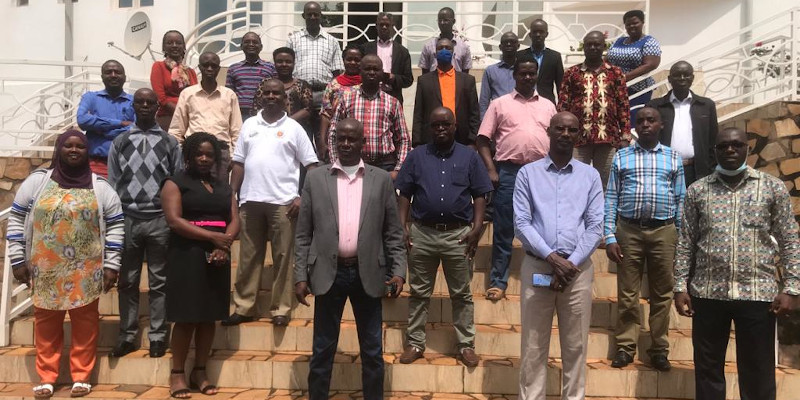MARKUP Conducts Training for Development and Harmonisation of Standards in Burundi
 Why do we trust that the coffee, tea, cocoa or food items we buy at supermarkets will be fit for human consumption, that it is free from contaminants or pesticide residues and other hazardous substances? What makes us sure that we can eat what we buy? It’s because we know that these products are subject to certain standards of production, packaging and storage that give us safety. Harmonised standards for food items in the East African Community are also of paramount importance for trading a great number of commodities that are an important source of income for all EAC Partner States, such as fruits and vegetables, horticultural products, avocados and flowers. Once a trading good is certified according to a standard, there is no more need for additional checks and analyses at border crossings.
Why do we trust that the coffee, tea, cocoa or food items we buy at supermarkets will be fit for human consumption, that it is free from contaminants or pesticide residues and other hazardous substances? What makes us sure that we can eat what we buy? It’s because we know that these products are subject to certain standards of production, packaging and storage that give us safety. Harmonised standards for food items in the East African Community are also of paramount importance for trading a great number of commodities that are an important source of income for all EAC Partner States, such as fruits and vegetables, horticultural products, avocados and flowers. Once a trading good is certified according to a standard, there is no more need for additional checks and analyses at border crossings.
A study carried out by EAC-GIZ in the EAC in 2019 observed that stakeholders responsible for developing and harmonising standards for the above-mentioned products in the East African Community lack the capacity and knowledge in their field of expertise that would enable them to participate effectively in the harmonisation of EAC standards. The study attributed this fact mainly to the limited awareness of the importance and the processes for setting and harmonisation of standards. Insufficient training and the absence of a manual to guide newly appointed office bearers to the Technical Committees for Standards (TCs) were pointed out as the main reason. Moreover, membership to the TCs changes frequently, hence there is a need for continuous training of national standards experts.
Addressing this knowledge gap, EAC-GIZ in partnership with the EAC engaged consultants to develop a training manual on the development and harmonisation of standards. They also initiated a Training of Trainers (ToT) to support a knowledge base on standards in all the EAC Partner States, enabling trainers to pass on the knowledge acquired to other TC members at their national level. The training manual was subsequently developed and a three-day ToT conducted online in December 2020. Sixteen national standards experts (three each for Kenya, Rwanda, Tanzania and Uganda, and four for Burundi) participated in the ToT.
The training of trainers is now being followed by a roll-out to national stakeholders through workshops on the country level. The first five-day national training of MARKUP stakeholders on the development and harmonisation of food standards was held in Gitega, Burundi from 18 to 22 January 2021. Participants were familiarised with the basic knowledge, skills and attributes for standards professionals. They learned about the importance of harmonised standards for the protection of human health and safety, environment protection and trade. The roles and responsibilities of the different stakeholders and the procedures set out for harmonisation of East African Standards under the EAC Standards Quality Management Act (SQMA) which formed an important part of the learning process.
27 participants from the public and the private sector of Burundi took part in the training. On behalf of the public sector, they included the National Standards Body, the University of Burundi, the Ministry of Agriculture, the Burundi Ministry in Charge of EAC Affairs, National Institute of Health and the Ministry of Trade. Participants on behalf of the private sector included the Modern Dairy Burundi-MDB, Fertilisants Organo-Minéraux Industries, SAVONOR, Burundi Federal Chamber of Commerce and Industry, Burundi Industrial Association, Cooperative MUTOYI, National Center for Food Technology, Burundi Consumers Association, Burundi breweries and lemonade, ODECA, OTB, ENESA, and SOSUMO Burundi Sugar Company.
The training was led by Mr Siméon Misigaro, Head of Standards Division and Coordinator of EAC standardisation activities at BBN, Mr Célestin Ntahomvukiye, Standard Officer BBN), Mr Eric Ruracenyeka, Standards Officer at BBN, and Miss Dorine Ntibaneneje, Burundi Ministry in Charge of EAC Affairs.
Mr Célestin Ntahomvukiye called upon the EAC Secretariat to further support the training efforts through increased sensitisation measures for policy makers on the importance of standards as a way to ensure sustainable support for training on standards development and harmonisation.